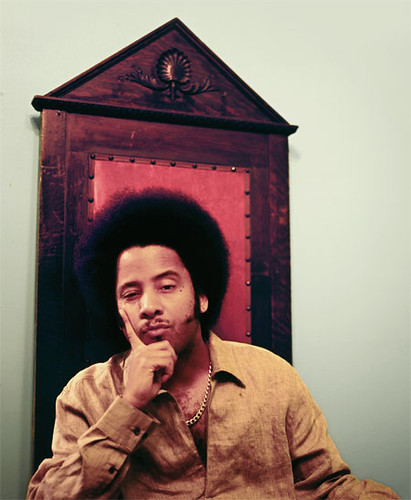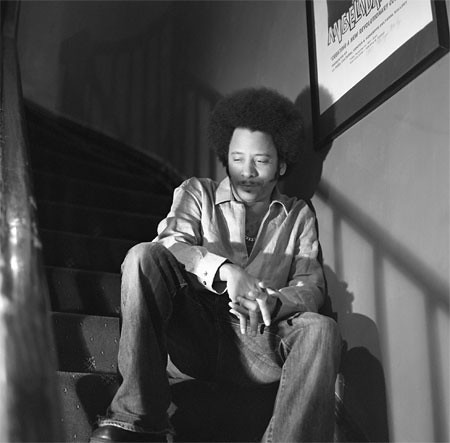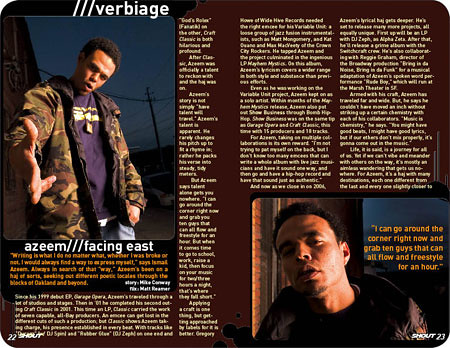Boots Riley: Long Time We No...
Interview By Jesse Ducker
Flix by Abi Klein

Revolution isn’t trendy for The Coup; it’s been in their DNA from day one. From the first full-length album, Kill My Landlord, in 1993, the group has been about chronicling the trials of everyday people struggling for revolution.
Subsequent releases, Genocide and Juice, Steal This Album, and Party Music shared the same themes. Records by The Coup reflect a connection with the everyday challenges that economically disadvantaged people go through. Can you name one other group that has recorded two different odes to the repo man?
Members Boots and DJ Pam the Funkstress have actively worked for social change over many years. Boots has been a member of three different progressive organizations, including the Progressive Labor Party where he “cut his teeth” from age 15 to 19. At this tender young age, he was getting flown out to places like Detroit, Chicago, and New York to speak at meetings to like-minded youths and adults. “It gave me the sense of being able to do things,” Boots said. “I was meeting real people doing real things.”
Though he now works with many other organizations, Boots says he isn’t a full-fledged member of any of them. At this point, he seems content with being a “free agent” for the cause. Now he’s preparing to drop Choose a Bigger Weapon, which will be released in early 2006.
It’s been four years since the world has heard a new album by The Coup. In some ways Boots knows he’s going to be starting with a clean slate. This is part of the reason The Coup signed to Epitath Records, known at one time as a rock label, but now the home to an increasing amount of progressive hip-hop artists. They’re also known to help artists go to the next level.
Armed with a new album and ready to educate those who need to learn, The Coup is a reader for a new musical and intellectual assault, and SHOUT had a chance to feel the fury...
SHOUT: What’s the science behind the title of the album, Choose a Bigger Weapon?
Boots: I got the album title from the poet Jessica Care Moore. Me and my girl were hanging out with her at a club. My girl had finished her fifth martini, and she was going back to the bar to get another. And Moore said to her, ‘Girl, it’s time to pick a bigger weapon.’ But for the album, it’s like we’re all involved in the struggle against the system. We’re all involved in the individual and collective struggle to survive. And now it’s time to up the ante.
It seems like organizations that work to help others aren’t as effective these days. What do you think the problem is?
The center of this struggle is around the day-to-day thing. Working on a day-to-day basis to make ends meet. The organizations out there need to get involved with these issues. The actual goals are nebulous. A lot of people that are involved don’t have the same day-to-day problems as a lot of the people who need the most help. Everyone can’t fly to Seattle to protest. Instead, they could be forming an organization to get everyone to join a union. Unions these days need a lot of help. Now it’s like management is working with the unions to make sure that people don’t ask for too much. Something militant could bring real change. They just need to get back to day-to-day issues. A collective struggle is effective.
The movement is scattered around. It isn’t focused. The struggle for wages and housing is ignored. In the 1920s, the Communist Party of the USA had one million members. The revolution was about helping people getting what they need, like jobs and housing. These groups have to work with the people. This takes a high level of organization.
So why do think the movement went off track?
It really started back in the 1960s with the student movement. The style of organization back then was based around students and how to get them hyped. The people that were struggling to survive got left out. After a while, the people who remained in the movement didn’t really know how to organize others. The training was exciting, but wasn’t based on real practical shit. It really got people involved to fight against the system, but the movement got into a lot of showboating.
Another problem is the growing involvement with all of these foundations and the grants that they give out. By giving out grants for only certain types of programs, they’re dictating what areas receive help. So these large foundations really set the agenda of what a lot of organizations try to tackle. For example, there are all these programs for violence prevention, which is the result of the Ford Foundation. This is what the Ford Foundation wants these organizations to use their resources working on, even though the statistics about violence prevention don’t hold up and show that this isn’t really such a huge area that needs help.
What types of issues do you tackle on Choose a Bigger Weapon?
The subject matter runs the gamut in terms of politics. We talk about sexual politics, politics on a personal level, all types of politics.
How would you say this album is different from the other four that you’ve recorded?
Lyrically, it’s very tight. The music is a lot more advanced than the stuff I’ve done before. I also used a different approach in putting the album together. Usually the album is made up of the first 10 or 12 beats that I record and like. For Choose a Bigger Weapon, I chose from 100 to 150 beats I liked.

How did you hook up with Kweli and Black Thought?
I met Kweli in 1999, and I’ve been doing shows with The Roots for a long time. The first one we did together was probably back in 1995. But I really got to know them when we did the “Black Artist Tour” in South Africa with the Roots, Kweli, dead prez, and Jeru the Damaja.
Are you working with any other artists on other projects?
Well, I did a beat for Kweli for his new album. And I’m doing an album with Silk-E, who’s touring with us and appears on Weapon. She has a solo song on our album called “Let’s Have This Baby Before George W. Bush Goes Crazy.”
Wasn’t there some talk that you were producing an album with Stic.Man from dead prez?
We were recording that album a while ago. Stic.Man wanted to record a solo album, and he really liked the sound of Party Music. He was out here for about a month, so I helped produce the album and helped him get that sound. We used the same musicians that were on Party; we recorded it in the same studio. He recorded a bunch of songs, and there were a bunch of labels interested in picking it up, but he decided to not put it out and start from scratch.
So now that hip-hop is a multi-billion dollar business for the music industry, where do you see things going?
What the major labels are doing is like cultural imperialism, just like anything under the capitalist system. Music is used as a tool to make these labels their money. And we’re caught in the system. Now, we’re not trying to create an alternative system, we’re trying to do something revolutionary.
Flix by Abi Klein

Revolution isn’t trendy for The Coup; it’s been in their DNA from day one. From the first full-length album, Kill My Landlord, in 1993, the group has been about chronicling the trials of everyday people struggling for revolution.
Subsequent releases, Genocide and Juice, Steal This Album, and Party Music shared the same themes. Records by The Coup reflect a connection with the everyday challenges that economically disadvantaged people go through. Can you name one other group that has recorded two different odes to the repo man?
Members Boots and DJ Pam the Funkstress have actively worked for social change over many years. Boots has been a member of three different progressive organizations, including the Progressive Labor Party where he “cut his teeth” from age 15 to 19. At this tender young age, he was getting flown out to places like Detroit, Chicago, and New York to speak at meetings to like-minded youths and adults. “It gave me the sense of being able to do things,” Boots said. “I was meeting real people doing real things.”
Though he now works with many other organizations, Boots says he isn’t a full-fledged member of any of them. At this point, he seems content with being a “free agent” for the cause. Now he’s preparing to drop Choose a Bigger Weapon, which will be released in early 2006.
It’s been four years since the world has heard a new album by The Coup. In some ways Boots knows he’s going to be starting with a clean slate. This is part of the reason The Coup signed to Epitath Records, known at one time as a rock label, but now the home to an increasing amount of progressive hip-hop artists. They’re also known to help artists go to the next level.
Armed with a new album and ready to educate those who need to learn, The Coup is a reader for a new musical and intellectual assault, and SHOUT had a chance to feel the fury...
SHOUT: What’s the science behind the title of the album, Choose a Bigger Weapon?
Boots: I got the album title from the poet Jessica Care Moore. Me and my girl were hanging out with her at a club. My girl had finished her fifth martini, and she was going back to the bar to get another. And Moore said to her, ‘Girl, it’s time to pick a bigger weapon.’ But for the album, it’s like we’re all involved in the struggle against the system. We’re all involved in the individual and collective struggle to survive. And now it’s time to up the ante.
It seems like organizations that work to help others aren’t as effective these days. What do you think the problem is?
The center of this struggle is around the day-to-day thing. Working on a day-to-day basis to make ends meet. The organizations out there need to get involved with these issues. The actual goals are nebulous. A lot of people that are involved don’t have the same day-to-day problems as a lot of the people who need the most help. Everyone can’t fly to Seattle to protest. Instead, they could be forming an organization to get everyone to join a union. Unions these days need a lot of help. Now it’s like management is working with the unions to make sure that people don’t ask for too much. Something militant could bring real change. They just need to get back to day-to-day issues. A collective struggle is effective.
The movement is scattered around. It isn’t focused. The struggle for wages and housing is ignored. In the 1920s, the Communist Party of the USA had one million members. The revolution was about helping people getting what they need, like jobs and housing. These groups have to work with the people. This takes a high level of organization.
So why do think the movement went off track?
It really started back in the 1960s with the student movement. The style of organization back then was based around students and how to get them hyped. The people that were struggling to survive got left out. After a while, the people who remained in the movement didn’t really know how to organize others. The training was exciting, but wasn’t based on real practical shit. It really got people involved to fight against the system, but the movement got into a lot of showboating.
Another problem is the growing involvement with all of these foundations and the grants that they give out. By giving out grants for only certain types of programs, they’re dictating what areas receive help. So these large foundations really set the agenda of what a lot of organizations try to tackle. For example, there are all these programs for violence prevention, which is the result of the Ford Foundation. This is what the Ford Foundation wants these organizations to use their resources working on, even though the statistics about violence prevention don’t hold up and show that this isn’t really such a huge area that needs help.
What types of issues do you tackle on Choose a Bigger Weapon?
The subject matter runs the gamut in terms of politics. We talk about sexual politics, politics on a personal level, all types of politics.
How would you say this album is different from the other four that you’ve recorded?
Lyrically, it’s very tight. The music is a lot more advanced than the stuff I’ve done before. I also used a different approach in putting the album together. Usually the album is made up of the first 10 or 12 beats that I record and like. For Choose a Bigger Weapon, I chose from 100 to 150 beats I liked.

How did you hook up with Kweli and Black Thought?
I met Kweli in 1999, and I’ve been doing shows with The Roots for a long time. The first one we did together was probably back in 1995. But I really got to know them when we did the “Black Artist Tour” in South Africa with the Roots, Kweli, dead prez, and Jeru the Damaja.
Are you working with any other artists on other projects?
Well, I did a beat for Kweli for his new album. And I’m doing an album with Silk-E, who’s touring with us and appears on Weapon. She has a solo song on our album called “Let’s Have This Baby Before George W. Bush Goes Crazy.”
Wasn’t there some talk that you were producing an album with Stic.Man from dead prez?
We were recording that album a while ago. Stic.Man wanted to record a solo album, and he really liked the sound of Party Music. He was out here for about a month, so I helped produce the album and helped him get that sound. We used the same musicians that were on Party; we recorded it in the same studio. He recorded a bunch of songs, and there were a bunch of labels interested in picking it up, but he decided to not put it out and start from scratch.
So now that hip-hop is a multi-billion dollar business for the music industry, where do you see things going?
What the major labels are doing is like cultural imperialism, just like anything under the capitalist system. Music is used as a tool to make these labels their money. And we’re caught in the system. Now, we’re not trying to create an alternative system, we’re trying to do something revolutionary.





